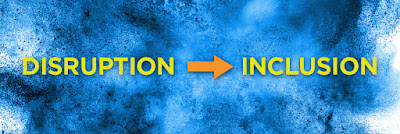Dear Botswana Tech Innovators: Build For Inclusion & Not Disruption
The word disruption has become quite ubiquitous with technological innovation over the last few years. Ever since Airbnb disrupted the hotel industry, Uber disrupted the taxi-hailing industry, Netflix disrupted the cinema industry and Robinhood disrupted the stock trading industry, most tech innovators have made it their mission to disrupt, first and foremost, whatever industry their innovation is a part of. Before we go anywhere, what is disruption, though?
In tech terms, disruption refers to using new technology to introduce a low-end product at low prices, improve the product over time and eventually overtake incumbent premium products using older technology or status quo. Think of Airbnb for example. Before it, the only option travelers had with regards to accommodation were hotels that could set whatever prices they wanted for mediocre service knowing that travelers did not really have much of a choice when picking where to lodge.
In came AirBNB. Not only did it give travelers a much-needed wider array of options when it came to lodging, but it also allowed the average house owner with a free backroom to basically compete with hotel conglomerates, leading to much cheaper traveling costs for globetrotters. RobinHood also did the same with stock trading, allowing the average person to be able to trade stocks commission-free from the palm of their hands while bypassing expensive stockbrokers in the process.
So clearly disruption is a good thing that makes life easier and cheaper for end-users so you might wonder why I'm dedicating an entire blog post to telling innovators to not make it their top priority. Well, the main reason is competition. In his book Zero To One, Peter Thiel, the co-founder of PayPal and an early investor in companies like Facebook and Instagram reiterates his stance that startups should avoid competition as much and as long as they can. Why? Because the perfect target market for a tech startup is a group of individuals served by few or no competitors. If you build something valuable where there was nothing before, the increase in its value is theoretically infinite.
By building for disruption, you are already building not primarilyto solve a problem but to compete with an incumbent who stands a better chance at launching a successful counteroffensive because they understand and have had more experience in that particular industry than you have. When you build for inclusion, however i.e. creating a product that will serve a previously unserved market or a "market-creating innovation" as Clayton Christensen, Efosa Ejomo and Karen Dillon termed it in their brilliant book "The Prosperity Paradox", you are setting yourself up for a theoretically infinite increase in your startup's value.
Every business is successful primarily to the extent by which it manages to solve a problem and not to the extent it manages to compete. Anything else, no matter how "disruptive" will fail to make much of an impact in the market. The same rule applies to technology companies. Your company should not be summed up by its opposition to existing firms i.e. how well it manages to disrupt industry incumbents. Rather, it should be summed up by how well it manages to create a completely new and lifechanging innovation that will change the lives of previously unserved people. That will reap you more rewards than trying to take decades-old enterprises out of business.
The success of fintech in the continent over the last two years or so has shown what stands to be gained by innovators who build for inclusion. Many of the continent's successful fintech startups like PayStack and Flutterwave have reached unicorn status not by trying to outcompete and take banks out of business but by rather offering services that incumbent banks were not offering. And the great thing is that because of its nascent tech landscape, Botswana, like Nigeria and other African countries where SaaS (Software-as-a-Service) startups have prospered over the years, is ripe with opportunities for innovators to come up with inclusive market-creating technology innovations.
My belief is that in developed technology markets like Europe and North America, disruption is sensible and logical because so many markets have already been served by earlier technology innovators so what is left is to disrupt old business models. However, in relatively new and burgeoning technological markets like Botswana's, so much of the population remain unserved in different sectors like finance, banking, health, agriculture, commerce, etc and technological innovators have a chance to come in and serve those markets with their innovations, making building for inclusion much more sensible and logical than building for disruption.



Comments
Post a Comment